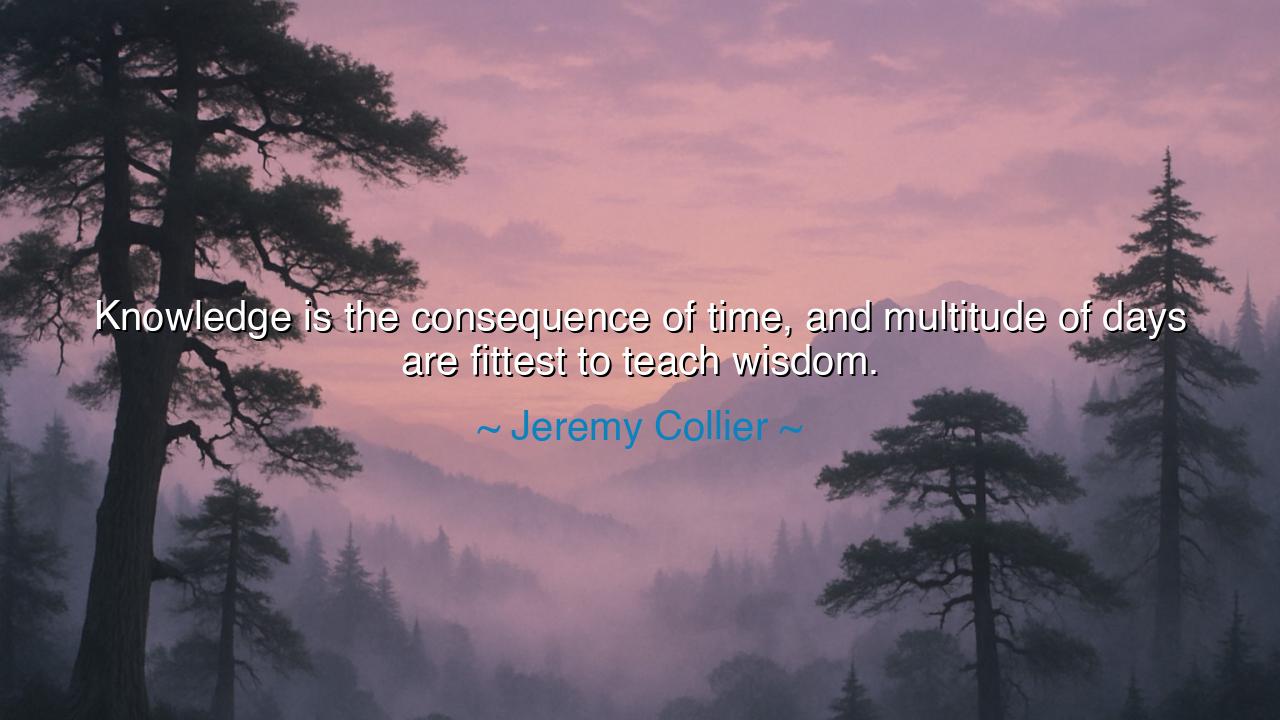
Knowledge is the consequence of time, and multitude of days are
Knowledge is the consequence of time, and multitude of days are fittest to teach wisdom.






Jeremy Collier, in his solemn reflection, declares that knowledge is the consequence of time, and that the multitude of days is the truest master of wisdom. He teaches us that truth is not seized in haste, nor can the young soul, however bright, grasp the fullness of life’s mysteries at once. For wisdom is not the spark of a moment, but the steady flame kindled by years, by trials, by victories, and by sorrows. Only through the long passage of time does the soul ripen into true understanding.
This is a rebuke to impatience. The restless heart longs to know all at once, to cut short the journey and leap to the summit. But the mountain of wisdom yields no shortcuts. Just as a river carves valleys over centuries, so must the spirit endure the countless days that chisel away pride and illusion. In this way, time is not our enemy, but our teacher—the silent companion who shapes us when we are too blind to see the shaping.
History bears witness to this truth. Consider Confucius, who in his youth gathered learning eagerly, but in his later years declared, “At seventy, I could follow my heart’s desire without transgressing what was right.” His wisdom was not born in the classroom, nor granted by the heavens in a flash, but cultivated over decades of teaching, reflection, and hardship. The multitude of his days bore fruit in teachings that endure for millennia. His life shows that wisdom matures only in the soil of experience.
There is also warning here: knowledge without the tempering of time is fragile, and wisdom forced before its season is unsteady. A soldier may learn the art of war in books, but only the scars of battle teach him prudence. A ruler may read laws, but only the suffering of his people teaches him justice. Without time, knowledge is like an unseasoned blade—bright to look upon, but brittle in the clash.
Therefore, let the seeker not despise the slow unfolding of days. Each sunrise and sunset carries its lesson, each trial its hidden gift. To endure them with patience is to be shaped by their quiet power. And when the end of days comes, those who have walked faithfully with time will not depart empty, but crowned with the treasure of wisdom—a gift that no haste, no trick, no fleeting brilliance can counterfeit.






KNkhanh nhat
This line makes me reflect on how time shapes perspective. The older we get, the more context we gain for our experiences, and that deepens understanding. But I also wonder—can hardship or intense experiences compress that process, giving some people the wisdom of a lifetime in a few short years? Collier seems to equate quantity of days with quality of learning, but maybe it’s intensity and self-awareness that truly forge wisdom.
MNVu Nguyen Minh Nhat
I like the humility in this idea—it suggests that wisdom isn’t something we can rush or control, but something earned gradually. Still, it makes me curious about people who seem naturally perceptive at a young age. Are they exceptions, or do they simply learn faster from fewer experiences? Perhaps Collier’s message is that true wisdom isn’t just learning facts but integrating them into one’s character over a lifetime of reflection.
XNPhan Xuan Nhat
This quote reminds me of the difference between information and insight. Time allows for perspective, for patterns to emerge from experience. But in an age where knowledge is instant—just a click away—does this idea still hold true? Maybe Collier’s point is that wisdom needs time to mature emotionally and morally, not just intellectually. Can technology, with its speed and convenience, ever replace the slow cultivation of understanding that life’s seasons bring?
TNLuong Thi Nhi
I find this statement both comforting and challenging. It reassures me that wisdom comes naturally with age, but it also raises the question—why do some people grow older without growing wiser? Experience seems to be a prerequisite, but it’s not always transformative. Maybe wisdom depends not just on duration, but on awareness—on whether we actually learn from what happens to us. Does mere longevity guarantee understanding, or only the opportunity for it?
MHMy Hai
This idea feels timeless—it ties wisdom directly to the passage of time and lived experience. Yet, I wonder if Collier is implying that youth can never truly be wise. Is age the only teacher, or can reflection and empathy accelerate understanding? In today’s world, young people often display insight far beyond their years. Maybe time alone isn’t enough; it’s how one uses time that determines whether knowledge turns into wisdom.